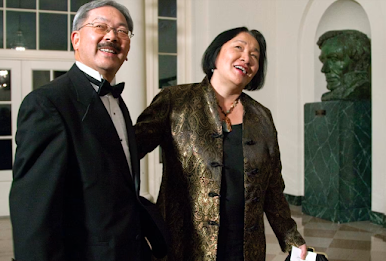 |
| Andrus Family Plot |
Washburne Royal Andrus was a two-term mayor of Oakland during a turbulent period in the city’s history, remembered both for his populist rise to office and his deeply prejudiced views toward Chinese immigrants. Born in Farmington, Connecticut, in 1841, Andrus came west to California in 1873. He became connected with the San Francisco Manufacturing Company, establishing himself in business before moving into politics.
By the late 1870s, Oakland was experiencing rapid population growth, expanding from 10,000 residents to more than 40,000 in a single decade. At the same time, economic pressures and xenophobic sentiment gave rise to the Workingmen’s Party, a populist, labor-oriented movement that found fertile ground in Oakland. Andrus was elected mayor in 1878 on that party’s platform, which was explicitly built on opposition to Chinese immigration. He won reelection, defeating D.W. Standefer, who had backing from both the Republican and Democratic parties.
 |
| Workingman's Party poster |
Nearly a century after his mayoralty, a handwritten “state of the city” address by Andrus, composed in 1879, was rediscovered in a City Hall cabinet. Spanning 52 pages, the address revealed both the challenges and the prejudices of Oakland leadership at the time. Andrus warned of a looming budget deficit, urged expansion of the police force from 22 to 30 officers, and cautioned against political favoritism in hiring. He also expressed frustration over alleged corruption in school affairs, including the rumored sale of examination questions and questionable contracting practices.
On crime, Andrus portrayed Oakland as unusually safe, noting that most offenses were petty in nature and that the extension of gas lamps into remote parts of the city had virtually eliminated highway robberies. He also sketched the qualities he believed essential for law enforcement officers: temperate habits, tact, shrewd judgment, and a gentlemanly demeanor.
The same rediscovered address also laid bare Andrus’s anti-Chinese stance. Reflecting the platform of the Workingmen’s Party, he railed against “the swarm of Chinese vegetable peddlers who infest the city.” His rhetoric mirrored widespread anti-Chinese agitation in California during the late 19th century, which culminated in the Chinese Exclusion Act of 1882. While Andrus saw the presence of Chinese immigrants as a civic threat, later Oakland leaders would acknowledge both the racial bias of his remarks and the resilience of the Chinese community. In 1975, then-Mayor John H. Reading contrasted Andrus’s words with historical reality, noting that “the passage of years has shown the Chinese to be the most stable of any of our ethnic populations.”
After leaving office, Andrus was appointed secretary of the Board of Railroad Commissioners in 1880, a post he held until 1887. His personal health, however, steadily declined. Around 1889, his eyesight failed, forcing him to retire from business. In December 1894, he suffered a paralytic stroke and became bedridden until his death on June 7, 1895. He was cared for by his wife, whom he had married in 1886.
 |
| San Francisco Mayor Ed Lee and Oakland Mayor Jean Quan (Atlantic magazine) |
Beyond her role in political history, Quan is also a serious history buff: she is known to join docent-led tours at Mountain View Cemetery, where she engages with the stories and legacies of Oakland’s past on a personal level. She shares much of this history on her own social media.
Sources: Olathe Daily News, San Francisco Call, Oakland Tribune, Find a Grave, Wikipedia, Atlantic magazine
No comments:
Post a Comment